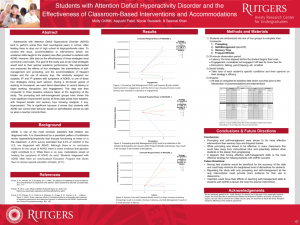Griffith, Molly: Students with Attention Deficit Hyperactivity Disorder and the Effectiveness of Classroom-Based Interventions and Accommodations
Title: Students with Attention Deficit Hyperactivity Disorder and the Effectiveness of Classroom-Based Interventions and Accommodations
Name: Molly Griffith
Major: Linguistics
School affiliation: Honors College, School of Arts and Sciences
Programs: Aresty – RA Program
Other contributors: Judith Harrison, Aayushi Patel, Seemal Khan, Nicole Swistack
Abstract: Adolescents with Attention Deficit Hyperactivity Disorder (ADHD) tend to perform worse than their neurotypical peers in school, often leading them to drop out of high school at disproportionate rates. To combat this issue, accommodations or interventions (which are academic skills taught to the student) are often provided to students with ADHD. However, little data on the effectiveness of those strategies most commonly used exists. The goal of this study was to see what strategies would lead to their optimal academic performance. We implemented and measured the effects of four strategies: the interventions of self-management and prompting, and the accommodations of frequent breaks and the use of sensory toys. We randomly assigned our subjects, 6th and 7th graders with symptoms of ADHD, to one of these four strategies during each session. During a 20-minute period of working on homework, we used direct observation to record latency to begin working, disruptions, and engagement. This data was then compared to three baseline sessions taken at the beginning of the study. The prompting and self-management groups have shown the most significant improvement across all three data points from baseline, with frequent breaks and sensory toys showing marginal, if any, improvement. This is significant because it shows that students with ADHD can correct their behavior based on self-reflection almost as well as when a teacher corrects them.
